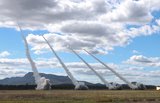Australia looks towards space with force restructure, investment and training
Australia is looking to improve its presence in space with a focus on communications and creating a dedicated segment of its defence forces committed to the domain.
Elbit Systems Ltd. announced today that it was awarded a contract to supply an advanced training and simulation solution for the Royal Netherlands Army. The system will be supplied during 2011.
The unique system is designed for training battalion and brigade-sized headquarters and provides users with a trainer for the widest variety of fighting scenarios - both low and high intensity conflicts and for other non-military settings (OOTW: Operations Other Than War). It also enables training for Civilian Military Cooperation (CIMC), for example with municipal authorities, police and medical organizations such as the Red Cross.
The system combines full training with qualitative debriefing. The simulation takes place within the operational headquarters and is connected to Command, Control and Communications systems. The advanced High Level Architecture (HLA) enables compatibility of the training with the specific needs of every trainee. With the help of user friendly interface and advanced artificial intelligence, the trainer also enables minimal use of personnel and thus saves training costs as well.
Yoram Shmuely, Co-General Manager of Elbit Systems' Aerospace Division, said: "We are proud of the fact that the Royal Netherlands Army has chosen our system, further strengthening the position of Elbit Systems as a world leader in the field of advanced training solutions. CST marks a milestone in Elbit Systems wide range of high end tactical training solutions, enabling land, airborne and naval commanders to practice command and control and decision making doctrines. We expect that this contract with the Netherlands, which is considered one of the leading countries in NATO, will lead to additional customers throughout the world".
Elbit Systems operates across the entire market of military Training and Simulation systems, in Israel and throughout the world, relying on its advanced technological capabilities, particularly in the area of software for complex project systems, and as a world leader in the upgrade of military platforms.
Source: Elbit Systems

Australia is looking to improve its presence in space with a focus on communications and creating a dedicated segment of its defence forces committed to the domain.

The Portuguese company’s naval communications system is in service across more than a dozen countries. It has turned to its home nation for support in developing a new vehicle based C2 system.

The Vision4ce Deep Embedded Feature Tracking (DEFT) technology software is designed to process video and images by blending traditional computer vision with artificial intelligence (AI) algorithms to present actionable information from complex environments.

Persistent Systems has been cleared by National Security Agency (NSA) to transmit sensitive data on commercial networks. The devices are added to the NSA’s Commercial Solutions for Classified (CSfC) component list which also includes other companies’ products providing the same security.

The release of the UK’s Strategic Defence Review (SDR) has been long promised as mid-year. It is possible it could be as early as 2 June although the UK Ministry of Defence (MoD) continues to play its cards close to its chest.

Intelsat outlines how its multi-orbit SATCOM architecture is enhancing connectivity and resilience for special operations forces operating in degraded and contested environments.